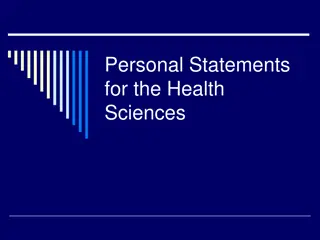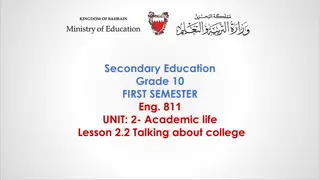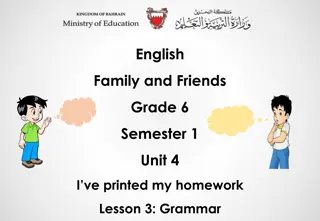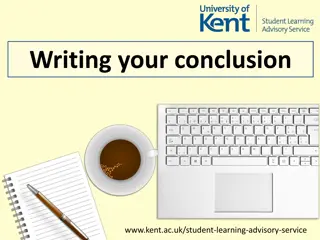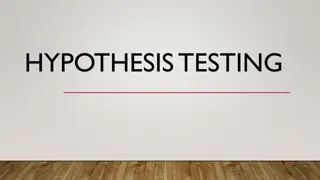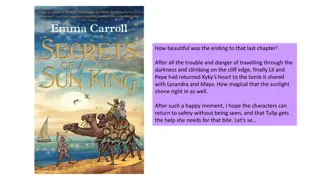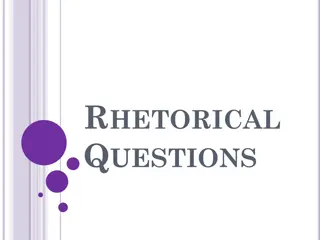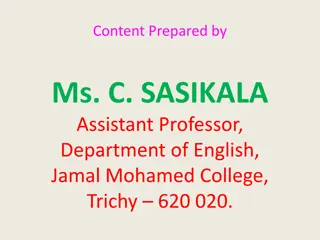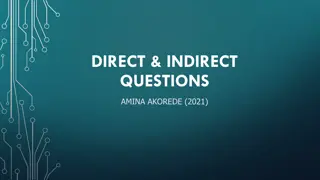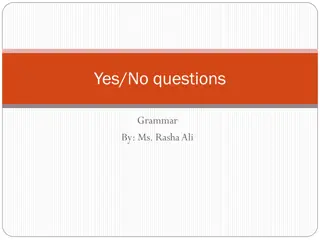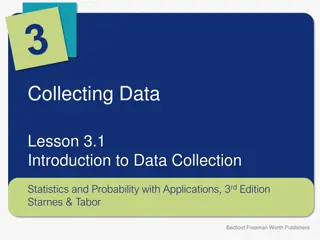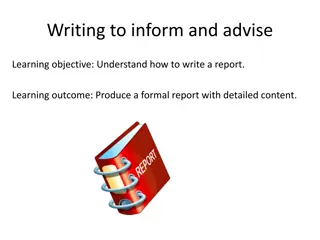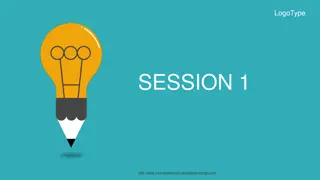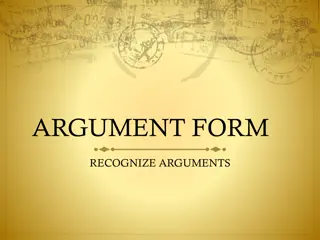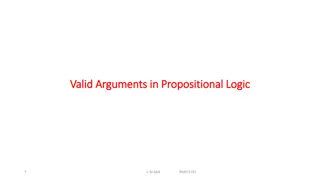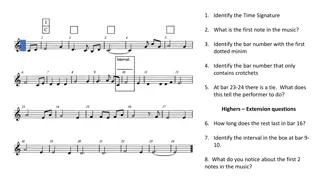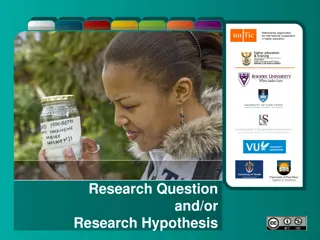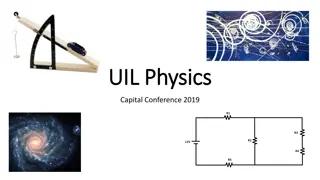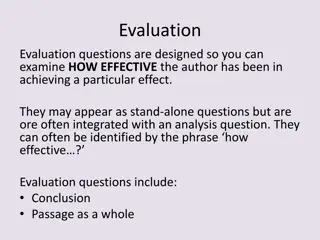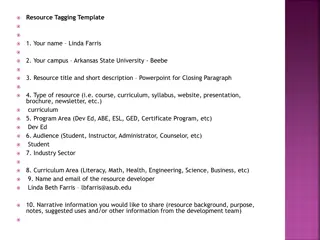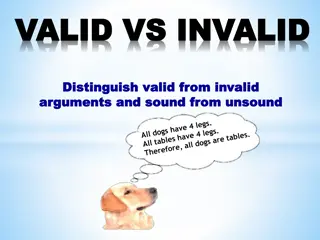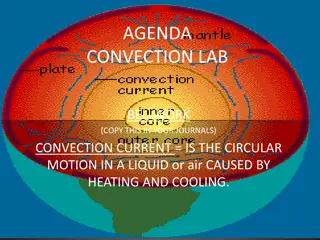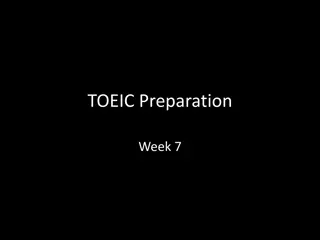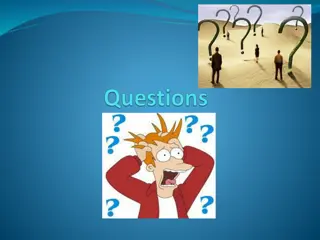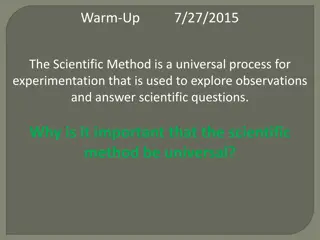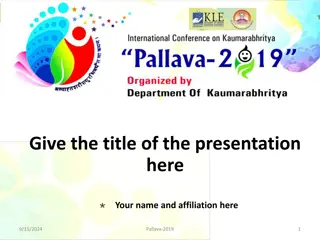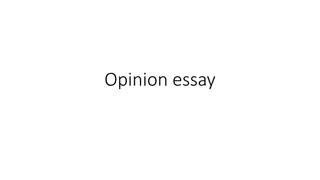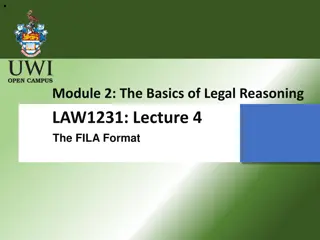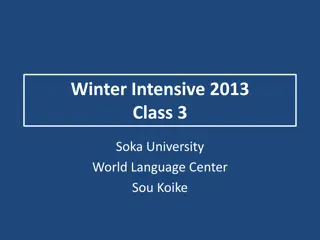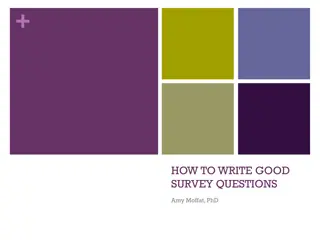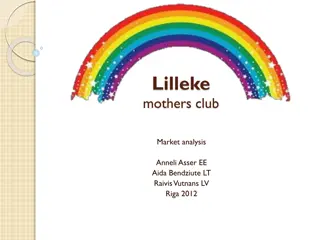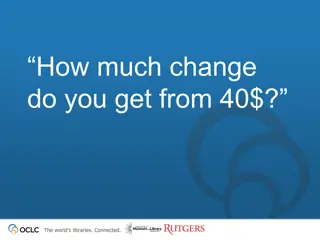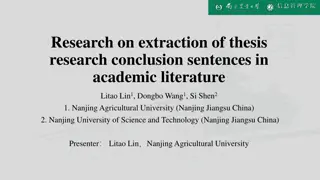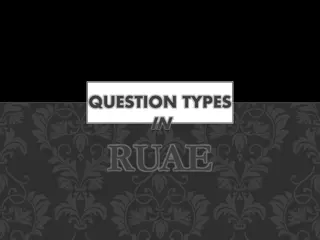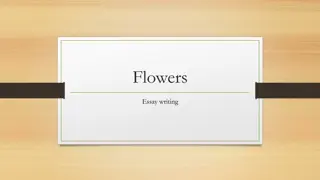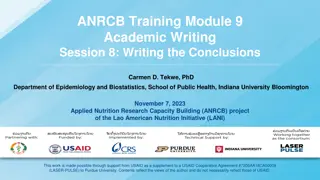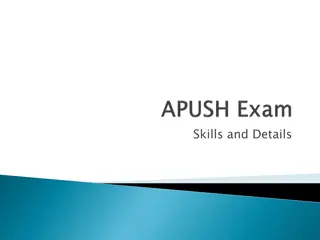Personal Statements for the Health Sciences
Learn how to create unique, compelling, and well-written personal statements for health sciences applications that showcase your passion, experience, and qualifications effectively. Explore tips on structuring the opening, body, and conclusion, as well as addressing specific questions posed on appli
1 views • 11 slides
Understanding Question Forms and Intonation in Academic English
Learn how to construct different types of questions and practice correct intonation when asking Yes/No questions and WH-questions in academic English related to college life. Enhance your skills in forming meaningful questions and recognizing the appropriate intonation patterns.
2 views • 10 slides
Learning Present Perfect in Yes/No Questions - Grade 6 English Grammar Lesson
Explore how to identify and use the present perfect tense in Yes/No questions through the engaging lesson on homework printing. Discover the structure and examples of asking and answering such questions correctly. Practice forming Yes/No questions using the present perfect tense with Cindy's chores.
14 views • 10 slides
Structuring Your Essay Conclusion Effectively
Understand the importance of essay conclusions, learn how to structure a conclusion, identify key elements of a good conclusion, reiterate the question, summarize main points, present conclusions or hypotheses, and ensure the question is answered with supporting evidence.
0 views • 12 slides
Understanding Type I and Type II Errors in Hypothesis Testing
In statistics, Type I error is a false positive conclusion, while Type II error is a false negative conclusion. Type I error occurs when the null hypothesis is incorrectly rejected, leading to a conclusion that results are statistically significant when they are not. On the other hand, Type II error
0 views • 6 slides
Enchanting Conclusion of Lil and Pepe's Journey
The last chapter culminates with Lil and Pepe returning Kyky's heart to the tomb shared with Lysandra and Maya, under the magical illumination of sunlight. As they hope for a safe return amidst the lingering danger, questions arise about Tulip's well-being and the characters' fate. Comprehension que
0 views • 10 slides
Understanding Rhetorical Questions: Meaning, Usage, and Examples
Rhetorical questions are used to persuade and influence people by posing inquiries that do not require actual answers. By delving into the meaning, purpose, and identification of rhetorical questions, this comprehensive guide sheds light on how these questions play a crucial role in communication an
1 views • 17 slides
Mastering Tag Questions in English Grammar
Explore the intricacies of framing tag questions in English grammar through various examples and guidelines. Understand the structure of tag questions based on the statement being positive or negative, with different scenarios explained in a detailed manner. Enhance your knowledge on tag questions a
9 views • 9 slides
Understanding Direct and Indirect Questions in English
Direct questions are straightforward inquiries we pose to people we know well, while indirect questions are used for politeness and softening the inquiry. This article provides examples, explanations, and practice exercises for mastering the use of direct and indirect questions in English communicat
0 views • 12 slides
Understanding Yes/No Questions in English Grammar
Yes/No questions in English grammar are essential for communication. These questions have two basic types - Yes/No questions and Wh-questions. Yes/No questions, also known as closed questions, have only two possible responses - Yes or No. To form a Yes/No question, verbs like BE, DO, HAVE, or modal
0 views • 9 slides
Introduction to Data Collection & Statistics: Understanding Statistical Questions, Population, and Sampling
This material introduces the fundamental concepts of data collection and statistics. Learning objectives include distinguishing statistical questions, identifying populations and samples, and understanding the difference between observational studies and experiments. It discusses the process of stat
1 views • 14 slides
Writing a Formal Report: Understanding and Advising
Reports are essential documents for conveying factual information, aiding in decision-making processes, and guiding actions. To write a proficient report, it is crucial to use formal language, maintain the correct format, present clear information, and ensure proper grammar and punctuation. Understa
4 views • 7 slides
Enhancing Language Skills Through Wh-Questions Workshop
This workshop focuses on developing language skills through the use of wh-questions. Participants engage in pair work, individual activities, and a presentation to practice asking and answering personal questions. The session includes activities such as writing personal questions, answering question
1 views • 8 slides
Logical Argument Examples with Premises and Conclusion
Examples of logical arguments presented in premise-conclusion format, showcasing how premises lead to conclusions in various scenarios such as academic requirements, police adages, political succession, and military roles.
0 views • 25 slides
Understanding Conditionals and Biconditionals in Logic
Conditional statements, also known as if-then statements, play a crucial role in logic. They consist of a hypothesis (following "if") and a conclusion (following "then"). By identifying the hypothesis and conclusion, writing conditional statements, evaluating truth values, and exploring converses, o
0 views • 19 slides
Understanding Valid Arguments in Propositional Logic
An argument in propositional logic consists of premises leading to a conclusion. Valid arguments are those where the truth of the premises implies the truth of the conclusion. To determine validity, you can construct a truth table to check if the conclusion always holds when all premises are true. T
0 views • 9 slides
Music Notation Analysis Questions and Answers
This content provides a series of music notation analysis questions with corresponding images for practice and learning purposes. The questions cover topics such as identifying time signatures, notes, rests, intervals, keys, and specific bars with certain musical elements like ties, dotted minim, cr
0 views • 12 slides
Effective Guidance on Research Questions and Hypothesis Development
Understanding the importance of formulating clear research questions or hypotheses is crucial for the success of a study. Research questions guide the research process, while hypotheses propose explanations to be proven. This content emphasizes the significance of correctly developing research quest
0 views • 14 slides
UIL Physics Capital Conference 2019 Topics & Questions Overview
The UIL Physics Capital Conference 2019 featured various physics topics and questions ranging from teaching quantum physics to dogs to fields like astronomy, measurement, uniform motion, forces, energy, and more. The event covered a wide array of physics concepts, and the directed study text focused
1 views • 25 slides
Analysis of Evaluation and Conclusion Questions in Textual Analysis
Evaluation and Conclusion questions play a crucial role in assessing the effectiveness of an author in achieving specific effects and summarizing key points in a passage. These types of questions are commonly found in textual analysis tasks to evaluate the success of conveying ideas and themes. Eval
0 views • 9 slides
Crafting Effective Closing Paragraphs in Essays
Explore techniques for writing compelling closing paragraphs in essays, emphasizing the importance of summarization, thought-provoking questions, and engaging the reader's curiosity. Learn how to structure your conclusion to leave a lasting impact on your audience.
0 views • 15 slides
Understanding Valid and Invalid Arguments in Logic
In logic, arguments consist of premises supporting a conclusion, with deductive arguments claiming logical necessity. Valid arguments have premises implying the conclusion, making them deductively valid. For example, if all actors are robots and Tom Cruise is an actor, then logically Tom Cruise must
0 views • 25 slides
Explore Convection Currents Lab Activity
Engage students in a hands-on lab activity to observe convection currents in action. The agenda includes bell work about convection, a hypothesis on confetti paper movement in hot water, detailed lab procedures, drawing conclusions with CER format, and thought-provoking conclusion questions related
0 views • 7 slides
TOEIC Reading Comprehension Strategies and Tips
The TOEIC Reading Comprehension section in Week 7 of preparation focuses on Single Passages with various subjects like business, travel, and technology. It includes different formats such as articles, business correspondence, and announcements. The test consists of 29 questions based on 10 texts, wi
0 views • 26 slides
Understanding Different Types of Questions and Short Answers in English Grammar
This content covers various question forms in English grammar, including general questions, special questions, alternative questions, tag questions, direct and indirect questions, yes-no questions, and short answers. It explains the structure and usage of each type of question with helpful examples
1 views • 24 slides
The Significance of the Scientific Method in Research
The scientific method is a crucial universal process that guides scientists in exploring observations and answering questions through a set of sequential steps. It starts with asking a question, conducting research, stating a hypothesis, designing and conducting an experiment, collecting data, and f
0 views • 18 slides
Study Presentation on Pallava-2019: A Comprehensive Analysis
This presentation showcases the study Pallava-2019, highlighting its introduction, purposes, methods used, results, and conclusion. The study is briefly explained, aims and objectives outlined, methods summarized, and results condensed with statistical conclusions. The presentation ends with a notab
0 views • 14 slides
Mastering the Art of Writing Opinion Essays
An opinion essay is a literary piece where the author expresses their stance on a topic with concrete arguments, supported by examples and reasoning. It typically consists of an introduction, three body paragraphs for arguments, and a conclusion. The introduction sets the stage, stating the topic an
0 views • 11 slides
Methods for Asking Critical Questions and Analysis Techniques
Explore various methods for asking critical questions such as open questions, closed questions, SWOT analysis, Paulo Freire's four open questions, the "But Why?" method, and the Five W's and an H technique. Each method encourages critical thinking and reflection to analyze situations effectively.
0 views • 7 slides
Understanding the FILA/IRAC Format for Legal Reasoning
Explore the FILA/IRAC format for writing legal documents, learn to identify correct and incorrect examples, and understand how to apply this format in problem-solving scenarios. The lecture introduces the basics of legal reasoning, focusing on the essential components of Facts, Issues, Law/Rule, App
0 views • 27 slides
Effective Conclusion Writing Strategies in Winter Intensive 2013 Class 3
Enhance your conclusion writing skills by mastering the art of restating positions, avoiding common pitfalls, and providing strong reasoning. Explore real-life examples and best practices from Winter Intensive 2013 Class 3 at Soka University World Language Center.
0 views • 15 slides
Mastering the Art of Crafting Effective Survey Questions
Crafting good survey questions is essential for gathering accurate and meaningful data. Dr. Amy Moffat, PhD, provides valuable insights on key characteristics of survey questionnaires, best practices for asking survey questions, and how to avoid common pitfalls like double-barreled and biased questi
0 views • 16 slides
Analysis of Lilleke Mothers Club Market in Tallinn - Target Group, Customers, SWOT & Conclusion
Lilleke Mothers Club in Tallinn targets Estonian females aged 16-45, offering support to young, adult, and experienced mothers, along with those expecting or planning a family. The club welcomes everyone, regardless of social status or education. The primary customers include young mothers and pregn
0 views • 10 slides
Analyzing Failed Information Seeking Questions in Social Q&A Services
The research focuses on unsuccessful information seeking questions in social Q&A platforms, aiming to understand why some questions fail and proposing ways to improve the structure to enhance successful answers. Utilizing data collection methods via the Yahoo! Search API, the study identifies and an
0 views • 21 slides
Automatic Extraction Model of Thesis Research Conclusion Sentences
Full-text academic literature contains rich data that can be analyzed using machine learning techniques. This research focuses on extracting thesis research conclusion sentences automatically to enhance summarization processes. The study involves data processing, annotation, and creating discriminan
0 views • 9 slides
Understanding Different Types of Questions in Reading Comprehension
Explore various question types in reading comprehension such as understanding questions, own words questions, analysis questions, evaluation questions, and how to effectively handle each type. Images illustrate examples and explanations for better comprehension.
0 views • 17 slides
Analyzing the Ending of 'Flowers' by Robin Jenkins
This essay guide provides a structured approach to analyzing the effective ending of the short story "Flowers" by Robin Jenkins. It includes steps such as reading the story, identifying what is effective about the conclusion, recognizing examples of imagery, and joining a class discussion on CommonL
0 views • 8 slides
Mastering Academic Writing Conclusions
Learn the essential steps to craft a compelling conclusion in academic writing, including restating the topic, summarizing results, addressing opposing views, stating significance, and offering recommendations. Understand the dos and don'ts to create a strong conclusion that leaves a lasting impress
0 views • 12 slides
AP US History Exam Details and Strategies
Get ready for the AP US History exam with a breakdown of the test structure, key historical skills, thematic areas, and scoring rubrics. Learn how to approach multiple-choice questions, short answer questions (SAQs), document-based questions (DBQs), and long essay questions effectively. Explore the
0 views • 14 slides
Mastering Tag Questions in English Grammar
Dive into the world of tag questions with this detailed lesson plan focused on helping learners understand and use tag questions effectively. Explore the concept, learn the mechanics, and practice creating tag questions for different scenarios. Enhance your English speaking skills and boost your con
0 views • 15 slides
